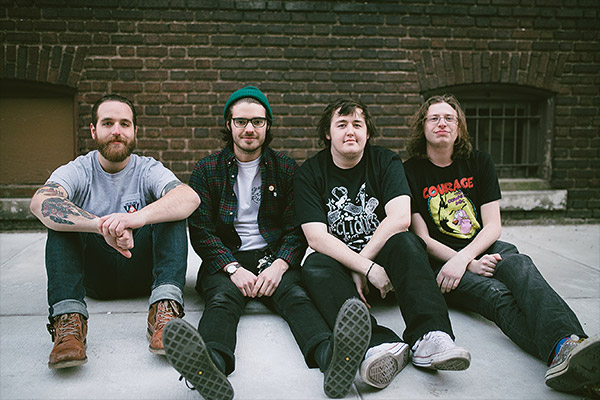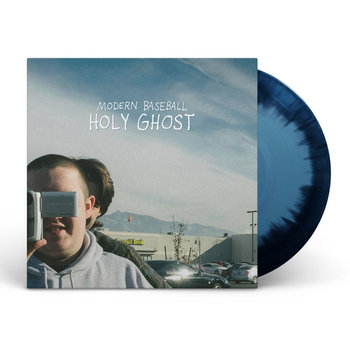
Holy Ghost, the third full-length by Philly’s Modern Baseball, is the kind of album where small details take on great significance. In the roaring, rapturous “Mass,” Jake Ewald doesn’t just write about missing someone, he dials in on the specifics: “Days like this I miss listening to records/ making coffee together/ snow globes and jersey sheets.” In “Breathing in Stereo,” Brendan Lukens summons a similar emotion, writing, “I can’t help thinking about you this whole ride home/ from Alberta, Portland to wherever I’ll soon unfold.” That deep focus, plus their ability to pair it with songs that are almost effortlessly melodic, makes Holy Ghost not only the band’s best record, but also one of the best rock records of the year.
It’s a great leap forward for a band who, up to this point, defused their more emotionally potent lyrics with quick punchlines or wry humor. There’s none of that on Holy Ghost. The record, for which Ewald handled the songwriting on Side A and Lukens on Side B, sprang from emotional turmoil. In a wrenching interview with FADER, Lukens talks about how his bipolar disorder drove him to attempt suicide, and how the band halted a planned tour so that he could spend five weeks in treatment getting the help he needed. And while many of the songs on his side of the record deal with that specific period of time, there’s a kind of emotional throughline that connects his songs to Ewald’s. Both of them grapple with getting older, missing friends, and trying find peace amidst deep internal conflicts. That they can do all of this while remaining strikingly clear-eyed and future-facing is one of the things that makes Holy Ghost so potent, and vibrate with such life.
We talked with Ewald and Lukens about the last year of their lives, and how they’re coming to terms with both their past and present.





Vinyl LP, Cassette, Compact Disc (CD)



I wanted to start by asking about the structure of the record. You split it in two, and each of you handle the songwriting for one full side. I was wondering not only how this idea developed, but how you think it impacts the final product.
Jake Ewald: Brendan called me many months ago and said, ‘For the next record, do you wanna do a Speakerboxxx/Love Below?’ And I said, ‘That’s a great idea.’ And that is, no lie, how it came about. But as we started writing the songs, we realized, ‘Oh, this is actually really neat, because we can have our own little chunk we can focus on, and be really involved in what the order’s gonna be, and how the songs are gonna flow into each other.’ At the same time, Brendan and I were dealing with a lot of the same broad feelings. So it kind of ended up flowing nicely from one half to the other.
Brendan Lukens: I like listening to the record and thinking of it as coming from the same person, they just get really angry on the second side [Laughs]. The second half is definitely a little thrashier, and the first half is a bit more contained, and part of that is because we were in our own little worlds, and we could dial in our guitars and bass to fit the world we were in. It was nice to be able to dive in deeper sonically.
The record feels like it’s shot through with a sense of loss. Most of the songs look back on the past almost with a kind of sadness.
Lukens: I think we were dealing with a lot of loss and change in our lives—grieving not only for ourselves, but for others. And all the while we were very far away from home, so there’s a sort of homesick quality to the songs—which could also be attributed to hating touring. We were dealing with so much change, either because of the loss of a loved one or the loss of a piece of ourselves. Or not drinking. A lot of people, when they look at us, they see us as a punk band who throws humor into their songs. And I feel like, as we’ve grown, and especially with this record, we can understand the humor in things, but we don’t always need to mention it.
Ewald: There were definitely moments writing this record where we were looking back at the past and trying to come to terms with it. Normally when I write a song, I would say something witty about the subject, or I’d try to understand it by dumbing it down. This time around we definitely tried to move past that and actually analyze the scenarios.
Lukens: Modern Baseball really reflects our personalities at the moment of each release. The EP is a great example of us kind of being angry at everything, and You’re Gonna Miss It All is a good example of our sarcastic, cynical side. With Holy Ghost, we were able to dive deep enough that we could let out all of those little beasts at once.
Another thing I noticed about the lyrics is that all of them contain references to very specific times and places—there’s Jeanette, the cashier in “Mass,” “dirty parking lots in Ottawa,” “the Tasker-Morris station.” A lot of times when bands do that, it can make a record feel insular. But I feel like in this case, it actually made Holy Ghost feel more universal. It kind of expands the emotional depth of the songs.
Ewald: I realized not long ago that the times when I connected most with other people’s music were the times when they would be specific—to the extent that it almost seemed foreign to the listener, because the artist was being so specific. But at the same time, since they’re being so specific, you know that they’re being entirely honest, and sharing a genuine experience.
Lukens: It’s like a conversation.
Ewald: They’re not attempting to generalize anything in an effort to become relatable. Instead, by being so specific, it actually becomes relatable, because you feel like you’re standing face-to-face and talking to them. Bands like The Weakerthans, The Mountain Goats, Pedro the Lion—those are bands that we were drawn to because of that exact quality. It’s like when you’re in an English class and your teacher says, ‘Show, don’t tell.’ You try to analyze the specifics of a scenario so the listener can put those pieces together and understand it on an even deeper level.
Over the course of the history of the band, you guys have essentially grown up together. How do you think your relationship with one another other has changed over that period of time?
Ewald: I think we’ve gone through numerous periods of being really open and vulnerable with each other, but also periods of doing the exact opposite. It feels like we’re always learning. No matter what happens or what we go through, we always crawl back to one another in tears, with pissed pants.
Lukens: It’s weird how little our dynamic has changed, just as far as how our friendship works. When we first met, it was a lot of hanging out for days at a time, and then not talking for days at a time.
Ewald: We actually were just saying yesterday, ‘We should really hang out more when we’re home, because we don’t do it at all.’ We get home from a tour and become hermits. But it’s like a marriage, man.
Lukens: Jake and I have known each other the longest, so I feel like we’re on a very psychic level of understanding with one another. I feel like all of us as a band are getting to that level. This record was a huge step for us, just as friends, growing together. Because after dealing with cancelling tours because of my treatment, and then spending 200-odd days with each other touring that same year. We were naturally going to hit a point where we were faced with something we hadn’t been faced with before, and it was ultimately going to help us in the end. Getting to the recording process and being able to write this record together, to have someone who we truly trust with [producer] Joe Reinhart in the room with us—it was a whole new breath for the band.
Have you found that, as you get older, you’ve become more aware of the passage of time?
Ewald: I think so. It’s definitely become more apparent the more the band grows. Because with getting older comes more responsibilities and more commitments, and the time spent at home is less about hanging out with friends and more about doing the things that we didn’t get to do because we were on tour. I know I’m having a moment right now where I’m starting to think about how, as an adult, you have to actively make time for hanging out with your friends, or make time for seeing your family. You have to consciously do those things, because if you don’t, you’ll just be on tour for three months and come home and be in a room for three months and then go back on tour for three months
Lukens: When we were dealing with having to leave school for a period of time, that woke us up as far as understanding how valuable our time at home really was. All of our college advisors were so helpful in telling us, ‘You need to properly plan this so that your life doesn’t end when the band ends.’
You see that a lot with career songwriters. Their whole lives can kind of run aground once their career is over if they’re not careful.
Lukens: And that sucks, and we never want that to happen. It definitely helped that our moms and dads were like, ‘We’re gonna fucking kill you [if you quit school],’ but we knew that we were going to be able to properly plan out our fun time and also make sure that our relationships at home with our family and friends and school all stayed on track.
Jake, you come from a religious background—your grandfather was a minister, your mom is a minister. I was wondering what ways, if any, that upbringing still colors the way you see the world.
Ewald: It’s kind of weird, because I went to church every day of my life, including the days when my mom was a minister and I was inside of her stomach. And then when I went to college, I cold-turkeyed on church. But any time I visit my parents, we go to church. So it’s weird periods of not thinking about any of it, to going home and being totally overwhelmed by it. But definitely since moving away and finding out more about myself I’ve been able to see religion in more of a practical sense, as opposed to when I was younger and being emotionally entrenched in it. And also being close to my family and seeing how it affects their day-to-day lives and the way that they face problems… I feel like by getting away from it, I’ve been able to understand it more.
Brendan, you were very open and honest about the things you’ve struggled with over the last several years in the interview with FADER. How has that impacted your relationship with your fans, if it has?
Lukens: We’re very lucky with our fans We have a very supportive, open relationship with them. There are a few dozen that I keep in close contact with, and a couple hundred I talk to every once in a while. I think, moreso than the FADER piece, the documentary was a big turning point for us as a band. Because most people know Modern Baseball as an all-white, all-male band who are sarcastic and corny. And a lot of the times, that kind of band can get a certain stigma attached to them, and it’s a stigma that we were starting to get. But most people who knew us knew that wasn’t who we are. I feel like with the documentary, people who already felt like they could trust us and talk to us just opened up that much more. So, yes, it’s definitely changed, but only for the better.
How you think you’ve both changed as songwriters since the band started, and what’s the evidence on this album to back that up?
Ewald: For me, when I’m writing a song, it’s usually extremely difficult to write something that’s not totally true and then stick with it. It’s been really weird to realize that there are different levels of being honest in your songwriting. I feel like at the beginning, we were both really honest in an obvious way, and that we said weird, quirky things and we were really blunt about our emotions. But I feel like now that we’re writing more complicated songs, we’re still being honest, but we’re finding ways to do it in a style that communicates more emotional depth and understanding. We’re almost being honest in a scarier way, as opposed to just being honest about things that—
Lukens:—that you should be honest about. I feel like we’ve also become more aware of the kind of songs that we want to write. Early on, it was almost like a song would start writing itself. We’d get a chorus or a verse, and we’d finish that song and not think about it too much. I feel like now, after intense listening to a lot of our favorite artists and intense listening on our own music, we realize exactly how we want to sound. I think a great example on the record for me is that all my songs are really short until you get to ‘Just Another Face,’ which is the longest song on the record, and that’s 100% on purpose.
Why is that?
Lukens: It’s supposed to be the part in the thought process on my side of the record where I’m coming to terms with everything—accepting that I’m going to be getting treatment, accepting that I do feel certain ways at certain times, but also know that’s not who I am—that’s my illness. There are ways to deal with that. While the other songs were short little clips of my bi-polarity, these short little moments in my illness—whether it’s, ‘I really miss home,’ or ‘I hate all of you guys.’—‘Just Another Face’ is the closing of all of that. It’s going from not accepting help, to realizing that I’m at fault, and then finally coming to the conclusion that I’m not in this by myself. I’m here to grow, and I have other people that are surrounding and helping me.
Ewald: For me, ‘Hiding’ was a big step, because it references my family and religion and all that stuff. I found ways to say a lot of things that, for a really long time, I’ve kept to myself. When I finished writing that song, I felt like not only had I said those things, but I felt proud of the way that I was able to do it.
Lukens: Jake’s always been my favorite songwriter, and I feel like the relationship that we have is almost a competitive drive between the two of us to want better for ourselves—wanting to sound better on the next record, wanting to grow. We want to improve. I remember when we stopped doing ‘Pay What You Want’ on Bandcamp so we could stop touring and we were like, [horrified] ‘We’re charging five dollars?!’ [Laughs] And it’s funny, because that mentality has stuck with us even now. All of our music on Bandcamp is either pay what you want or five dollars. That’s just who we are as people. In the end, it feels like Modern Baseball is this book that we’re writing. It’s something we’re constantly improving on. And I’m sure, one day, we’ll finish it.









